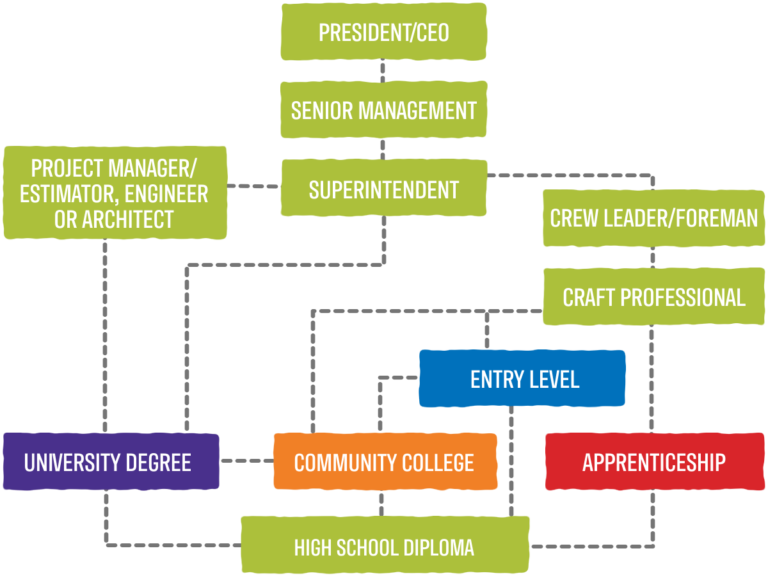For Parents
Do you have a child interested in a career in the design and construction industry? Are you looking for information for a child that isn’t sure what they are wanting to do? We’re here for you!
First things first. Construction is essential.
Without construction, there is no economic development. New hospitals and schools couldn’t be built. New homes couldn’t be built. Roads and bridges would be undriveable. Businesses couldn’t expand.
Construction is vital to our economy and essential to businesses and homes alike.
Although people complain about the price to hire a skilled tradesman – plumber, electrician, roofer, etc. – they don’t always consider the reason.
Let’s talk about the money.
The concept of increased knowledge and skill equating to higher wages is true in almost every industry. Construction is no different. Regardless of how someone enters the industry – straight into the workforce, apprenticeship program, trade school/community college, or bachelor’s/master’s degree – they have the potential to move up. If someone has an interest in the trades as a craftsman, they will increase their pay as they progress from an apprentice to a journeyman then a master. Check out the Build Your Future website HERE for information on national averages on salaries.
Where do women fit in?
Did you know construction has the smallest gender wage gap as an industry? According to a study of 20 different industries, construction reported the smallest gender wage gap in 2019. While the overall gap was 81%, the construction specific gap was 99%. That means a woman worker makes 99 cents on every one dollar a man makes on average compared to 81 cents on a dollar average across all industries.
MYTH BUSTERS
There are a lot of myths about the construction industry. Let’s break down some of the common ones.
Myth: Construction is a dead-end job. It’s hard work they can’t do their whole life. What will they do when they can’t physically work in construction?
Reality: There are career pathways set up to help someone progress into a variety of positions. Someone can fast track their career if they have their eyes set on design or management positions by pursing a bachelor’s or master’s degree. If they choose to pursue a craftsman/tradesman position, there is still room to advance into management.
Myth: They won’t make enough money.
Reality: Regardless of how someone enters the industry – straight into the workforce, apprenticeship program, trade school/community college, or bachelor’s/master’s degree – they have the potential to move up. If someone has an interest in the trades as a craftsman, they will increase their pay as they progress from an apprentice to a journeyman then a master. Check out the Build Your Future website HERE for information on national averages on salaries.
If you look at someone’s lifetime earnings, you might be surprised at who makes more – someone in the trades or someone who went to school for a bachelor’s or master’s degree. The cost of student loans, losing out on high wages for the years you are in school, and the variance of pay post university means the career pathway you select matters more than just deciding to go to college or not to go to college. Check out this article for a deeper explanation.
Myth: Smart people don’t work in construction. You should only choose a career in construction if you’re bad in school or don’t want to go to college.
Reality: Most careers in construction involve math or some type of higher education training. Career paths like construction management, architecture, engineering, and interior design require a bachelor’s or master’s degree. Many trades have an option to attend a community college/trade school, and apprenticeship programs include a classroom portion.
Myth: People in the trades lose their jobs during a recession.
Reality: Although there may be less new construction during a typical recession, there is always a need for trades like plumbers, electricians, roofers, and other service-related careers. There are many jobs that will be obsolete in the future as technology progresses. Construction utilizes technology to be safer and more efficient, but most of the careers cannot be replaced by technology. There will always be a need for all levels of construction.
